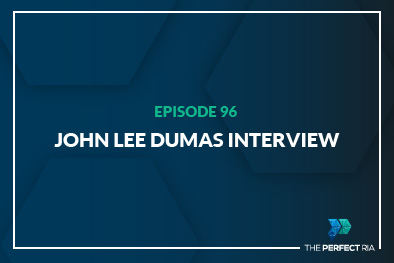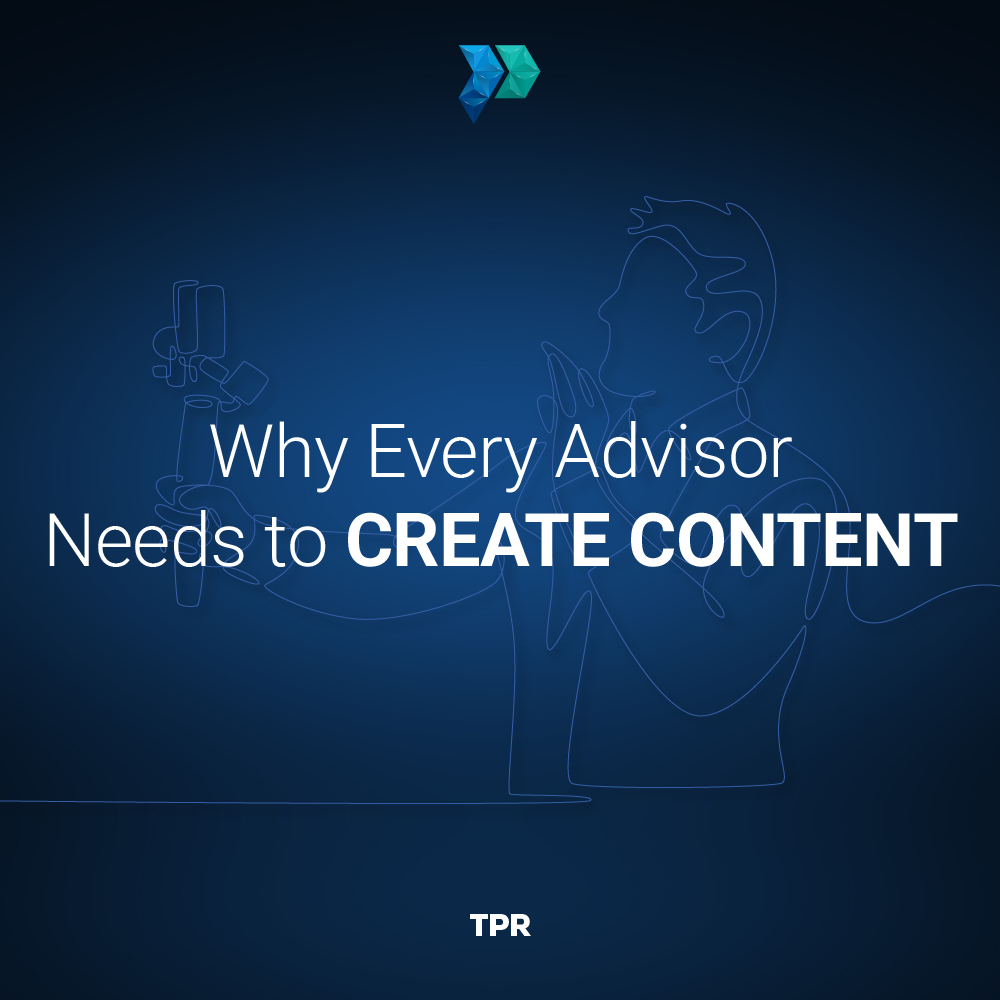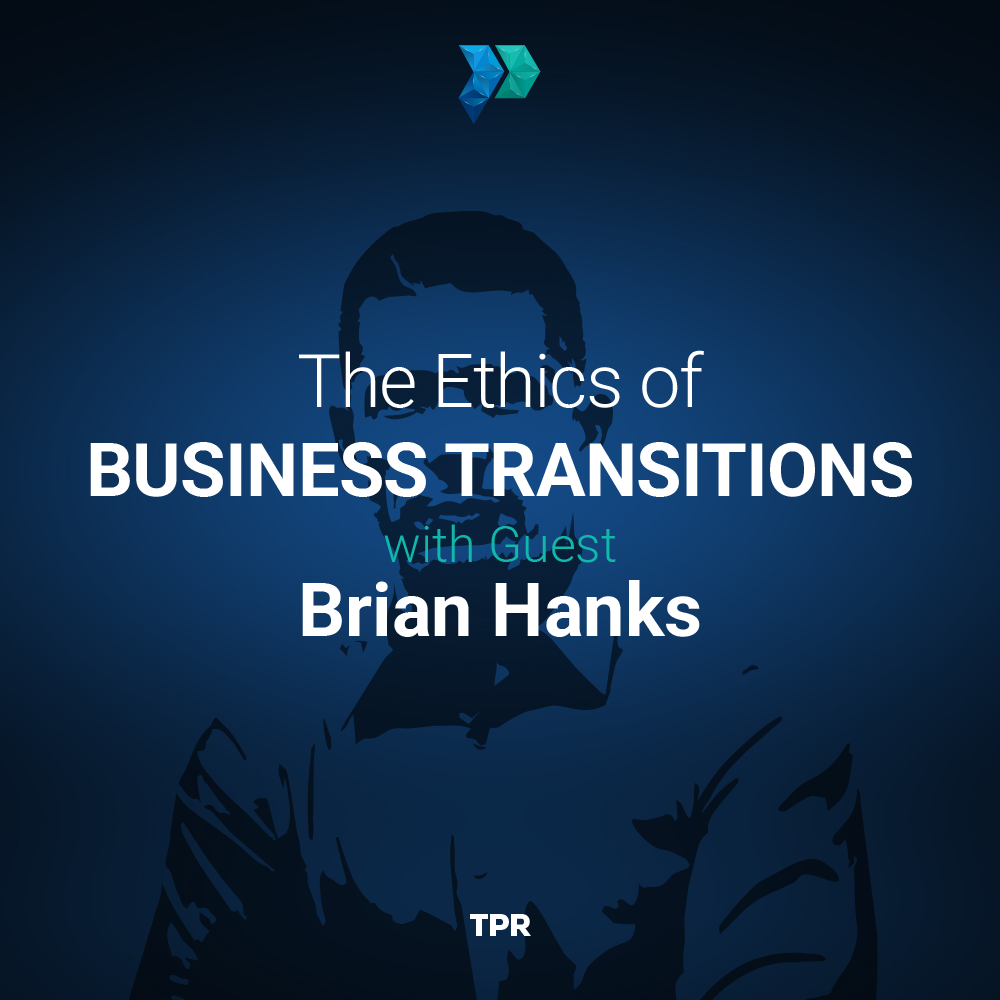What You'll Learn In Today's Episode:
- How John has evolved from the early days to his current success.
- Why he does 20 podcast interviews in one day, rather than spreading it out over the week.
- How long it took him to see a return on investment on his podcast.
- Why he chose to be transparent about his finances.
- How Pat Flynn inspired John to be open about his monthly income reports.
- How you can use transparency to cultivate credibility.
- John’s advice for those in the early stages of their own podcast.
While we, like many financial advisors, take pride in doing 30-40 surge meetings in a week, John Lee Dumas does 20 podcast interviews in one day. And that’s not the only thing he does exceptionally well—John has crushed podcasting as the founder and host of the award-winning and hugely successful podcast, Entrepreneurs on Fire.
In this episode, John sits down with Matthew to talk about why he decided to batch record podcast interviews (and how he spends the rest of his week), as well as why he chose to be very transparent about how much money he makes—and spends—every month. Listen in to learn what his podcasting journey looked like, how long it took before saw any ROI, and his one action takeaway that you definitely don’t want to miss.
Ideas Worth Sharing:
Am I a person of success or a person of value? - @johnleedumas Share on X If I ever get to a point where I’m making real money online, I want to inspire other people in the same way. - @johnleedumas Share on X Take a good look in the mirror and ask yourself: Is my podcast solving the best problem to the best solution that is possibly out there? - @johnleedumas Share on XResources In Today's Episode:
- John Lee Dumas: Website | Podcast | Facebook | Twitter | YouTube | Instagram
- Matt Jarvis: Website | LinkedIn
- Micah Shilanski: Website | LinkedIn | Twitter
- The Smart Passive Income Blog by Pat Flynn
- Gary Vaynerchuk
- The Backstage Pass
- The Perfect RIA LinkedIn Page
Read the Transcript Below:
This is The Perfect RIA, in case you didn’t know. Bringing you all the strategies to help your business grow. Are you happy? Are you satisfied? Are you hanging on the edge of your seat? Sit back and listen in while you feel the beat. Another myth bites the dust…
Matthew Jarvis: Hello, everyone. Welcome to another episode of The Perfect RIA Podcast. I am your co-founder and co-host, though today I’m hosting alone, Matthew Jarvis. Mr. Micah, I recorded this. What follows, I recorded this interview without Micah, because it seems to work better when there’s just one person doing the interviewing. But what follows is an interview I did with John Lee Dumas of eofire.com. And I became aware of John several years ago when I stumbled across his website. And I recommend you go check it out right now unless you’re driving, or if you’re driving in a Tesla like I do, that’s fine. Check on his website, EO Fire. On his website, he has very transparently how much money he makes every month and how much money he spends. It’s probably one of the most transparent people I’ve ever seen with their income and their expenses.
And a couple of things that drew me to John. One, of course, was that, but the other was that I realized, hey, this guy is really doing a great job with his podcast. He’s making a lot of money because I only assume that his numbers he’s sharing are accurate. And so Micah and I reached out to him and said, “Hey, John, how much does it cost for an hour of your time?” And it was several thousand dollars. And Micah and I said, “Great that’s money well spent.” Because what we can learn from him in an hour, we couldn’t get if we spent hours and hours and hours studying his classes and we, of course, have the luxury to write this check.
So as we were talking to him, he explained to us, he showed us his calendar for a minute and showed us that in an afternoon he does 20 podcast guest episodes at once. 20, which blew my mind. But it was one of the few times I’ve seen Micah off his game. Of course, Micah takes great pride in the fact that during surge week, he’s doing 30 to 40 meetings in a week. And John Lee’s doing 20 in one afternoon. It was amazing.
So we arranged to have John Lee on the podcast to do the interview that follows. As you listen to this interview, I want you to watch for three things. One, of course, I just mentioned that he’s doing 20 meetings a day. Now it’s easy for us to say, well, guests sitting on podcasts is different than being an advisor, et cetera, et cetera. That’s a limiting belief. It may, in fact, be different. But instead, approach it with, if JLD can do this, if he can do 20 meetings in one afternoon, how can I adapt some of his philosophy to improve mine? So that’s number one, watch for that 20 meetings a day discussion.
Number two, look at his transparency, right? He went into a very crowded market, podcasts, right? We talk about this and he says, “Boy, I’m going to do things. I’m going to be Uber transparent. I have got to share my income and expenses every month.” Now I don’t necessarily recommend that you do that. You could, it would be an interesting exercise. But I think it speaks very strongly to Micah and I’s passion that however your investing client money should be identical to how you’re investing your own money and you should be willing, and I mention this to all prospects, hey, if you’d like to see how I invest my money, it’s the same as I invest yours. I’d be glad to show my statement. So, how can you add more transparency to the process in a way that adds credibility?
The last one I want you to watch for in this interview and is towards the end where John Lee talks about, this was our opening quote, “Am I a person of success or a person of value? Am I trying to chase success for myself or am I trying to chase delivering massive value, in this case, your audience, or for us as advisors to our clients? And if you’re solving for delivering massive value, a core tenant of The Perfect RIA, success will inevitably follow. And if you try to chase it the other way, if you’re trying to get money or success without delivering value, that is a hollow future.
So I hope you enjoy this interview with John Lee Dumas. I know that I very much enjoyed it. If you have recommendations for guests on The Perfect RIA Podcast, shoot us an email at lifestyle@theperfectria.com. And enjoy the podcast. And until next time, happy planning.
John Lee Dumas: Yo, yo.
Matthew Jarvis: Hey, there he is.
John Lee Dumas: Ola.
Matthew Jarvis: How are you, buddy?
John Lee Dumas: Puerto Rico’s sun is shining. Our birds are singing. Life is good.
Matthew Jarvis: I love it. I love it. Now, let’s jump right into this thing because I know you’re on a tight schedule. Because how many podcasts guest episodes do you do in a typical day?
John Lee Dumas: 20.
Matthew Jarvis: 20 in one day. Now, 20 in one day, that just blows my mind because I like to do 20 meetings in a week. But why not do, what’s that, four a day? Why not do four a day instead, instead of 20 in one afternoon or in one day?
John Lee Dumas: Because that would be a horrible use of my time because then I would essentially just be doing podcast interviews every single day. And knowing that that’s part of my day, every day, instead of just waking up and saying, you know what? I have 20 interviews today and this is the one day per month that I do this. This is my Super Bowl of interviews on other shows. I’m going to flip and crush it.
Matthew Jarvis: That’s awesome. So you have one day a month where you’re doing 20 interviews on other podcast episodes. So like you said, it just gets you in the zone. You’re not waking up each day thinking what am I doing today? Probably since you’re in Puerto Rico, you’re on the beach those other days.
John Lee Dumas: I actually much prefer hanging out by my pool in my backyard with a beautiful view of the beach, by the way. But much more enjoy my backyard than the beach.
Matthew Jarvis: How did you come to the idea of doing all of your meetings on a one day? Obviously, you’ve been doing it longer than The Perfect RIA podcast has been about. So you figured this out before Micah and I even started talking about it.
John Lee Dumas: Yeah. Because I’m just a batching machine. Back in 2012, when I was going to launch the first-ever daily podcast interviewing entrepreneurs, all of the top people in the podcasting industry said, John, you’re crazy. There’s a reason why people do podcasts one day per week because you’re going to run out of gas. You’re going to out of time. You’re going to get burned out. Your listeners will get burned out. And I said, wait a second. If the best people in the podcasting space are saying it can’t be done and I figured out how to do it, that’s a winning combination. There’s a huge opportunity there. So I sat down, I said, how could this actually work? I said, well, what if I did one day with eight interviews? And I just went all-in, all-energy, and then I had the other six days to grow the other parts of my business and also relax and recuperate, would that work? And the answer was yes. And eight years later, 2,600 episodes later, the answer is still, yes.
Matthew Jarvis: That’s amazing. I love that. I love the idea of saying what’s everybody telling me can’t work, and without any evidence, saying that it can. So I’m thinking show, hey, we’ve found, we’ve tested this, it doesn’t work. And so you’ve gone outside of the box if you will. Now, that’s not the only area where you’ve gone outside of the box. I was on your website just this morning, EOF Fire. And you still have it. It blows my mind every time I go on your website. You have there on the top, right corner, the income that your platform has earned this month. How did you get the idea to do this? And then, does it not bother you that everybody in the world knows how much money you’re making?
John Lee Dumas: Eofire.com. And, yes, for 84 months in a row now, 84 months in a row, we have published our monthly income reports. And I do this for a very simple reason. Back in 2011, I didn’t think you could honestly make a living online being a good person, adding real value. And then I stumbled across this guy, Pat Flynn of Smart Passive Income.
Matthew Jarvis: Oh, sure. Yeah.
John Lee Dumas: And he was publishing income reports. And I said, oh my goodness. Look at this guy. He’s a family man. He seems cool. He’s adding real value to the world. And he’s making real money. If I ever get to the point where I’m making real money online, I want to inspire other people in the same way by showing them, hey, this is how you can generate revenue. This is how you can utilize expenses. So we have everything. We have all the revenue we make, all the different income streams all listed out step by step by step, line by line by line. Also, all of the expenses it takes to run our business. So people are just like, “John, how do you run your business?” I say, go to eofire.com/income and you can see all of the tools that we use and how much they cost.” And then we bring our accountant on every single month to give a tax tip. We bring our lawyer on every other month to give a legal tip. And it’s a value-packed episode and a value-packed post.
Matthew Jarvis: Wow. Yeah. Talk about delivering massive value. Now, I want to highlight two things about that. One, Pat Flynn, and what’s his, it’s Smart Passive Income or his …
John Lee Dumas: Mm-hmm (affirmative).
Matthew Jarvis: I assume the reason you started modeling after Pat Flynn is because he, in fact, had a successful podcast, right? Even in 2011, there was a million people talking about, these talking heads about how to make a bazillion dollars online by selling crap on an Amazon store or something. I think I know the answer but why model Pat and not all these other experts out there?
John Lee Dumas: So I wouldn’t say I actually modeled Pat because that’s never the direction that I took, but I was inspired by his income reports. And so that is one thing that I took and said, “You know, what, if I end up making revenue, I also want to be sharing and being transparent and open and genuine so people can come on my journey.” And, Pat was doing a lot of things in a lot of different areas, which is really cool. He was doing a lot of blogging. He was doing apps. He was doing niche sites. I just went all-in on podcasting. That was my one sole focus. I went all-in and here I am eight years later.
Matthew Jarvis: Today’s podcast is brought to you by Surge Meetings. Feel like you don’t have enough time in the day or the week? Constantly putting out fires that keep you from delivering massive value to your clients? We have great news for you. The listeners of The Perfect RIA Podcast can now access our time management video training series for free. Can’t believe it’s free. Do we really do free things? For free by visiting tprdev0.wpengine.com/time and entering the code, what time is it, to get access today. See you there.
Now here you are eight years later and we see the income number. And I won’t spoil it because I want people to go to your site because it’s really powerful to look at that. How many episodes or how long did you do your podcast before you saw anything that you would count as an ROI
John Lee Dumas: 13 months. Which by the way, when you do a daily podcast, that is like 400 episodes.
Matthew Jarvis: Wow.
John Lee Dumas: So, it was not overnight. It was not over months. It was well over a year before we really started generating any kind of significant revenue. And since that month, the month 13, we haven’t generated less than a $100,000 net profits any month for 84 months in a row.
Matthew Jarvis: Wow. That’s awesome. Well, I just want to highlight that. Maybe you can speak to this a little bit more because we see so many and again, we’re talking specifically to financial advisors, they’ll start a marketing channel, be it podcasting or blogging or seminars or anything, and they’ll get four or five or six times or months into it, and they’re like, well, this doesn’t work and they walk away.
John Lee Dumas: That’s why they lose. It took me 480 episodes before I felt comfortable behind the microphone. I mean, people that are spending three, four, five months podcasting once a week, A, they still suck as a podcaster.
Matthew Jarvis: Sure.
John Lee Dumas: I mean, why wouldn’t they? I mean, they haven’t practiced enough. And B, I mean, they’re not seeing any results because they haven’t been doing it often or long enough. So, that’s the reality. We call it pod-fading and it will always exist. But the people that don’t pod-fade see great results.
Matthew Jarvis: That’s amazing. Do you ever worry about giving away too much content, or too much transparency, or you’re handing out too much value? It seems like a weird way to put it, but like, oh, I know everything that John Lee has to say, why would I buy his stuff? Why would I follow him further? What are your thoughts there?
John Lee Dumas: I don’t think that’s possible. To me, I’m just wanting to give as much as I can. I’ve always had that mentality. I’ve still somehow netted over a million dollars a year for seven-plus years in a row. So, I’m fine with that. I’m in a good space. And I say that genuinely because guess what, I could be grinding and potentially getting up into the eight figures. I could have the potential to do something like that if I built a bigger team, spent a ton more on advertising, did this, did that. But frankly, I don’t want that. And I just don’t. I’m very open and honest and just living in a world of my reality of what I personally want, what my life and business goals are. I want to spend a lot of time each day on my health, on my wellness, working out, eating right, doing those things. I want to spend a lot of time by my pool reading, not doing really any kind of work, hanging out with my dog, hanging out with my girlfriend. Those are things I want to be doing.
And some people want to grind and they want to get to eight figures. And I applaud that because they need to be identifying what they want and going for it. I love Gary Vaynerchuk. I think almost everything he says is 100% amazing. And I will forever say that as long as he keep saying the same things, but the reality is the last thing I want is to be running an 800-person company in New York City. That is not what I want. But he wants it and he’s loving it. And that’s what people need to really sit down and say, hey, am I just doing something because somebody else is having success doing it, or am I doing it because I actually want to do it at my heart, at my soul, at my core? I want to be here on the southeastern corner of Puerto Rico, which is already 1,200 miles out in the Caribbean Ocean from the Florida coast. I want to be out here in my bubble doing my thing and I love that, but it’s not for everybody.
Matthew Jarvis: John, does that intentionality, I guess, does that intentionally apply when you were at the beginning of your career? So listeners might think, well, boy, what a sacrifice, I don’t want to go from seven figures to eight figures, right? Some people are kind of cynical on that. But what about the earlier days in your career, those first 400, 500 episodes when you were grinding it out, was that always your goal, or how did you deal with intentionality when it was survival and not, luxury is a little too flippant, but on the other end of the spectrum?
John Lee Dumas: No. I mean, it really was a grind and I didn’t really know what I wanted back then. I’ve evolved as a human, as a business owner, as just a podcaster, as an entrepreneur. Over the years, I’ve evolved. There was a time in 2012, ’13, ’14, where I was only grinding and I paid for it on the health side of things. I paid for it on the quality of life side of things. And it was a lesson I had to learn. At the same time, it was a great lesson to learn because I can always look back on that at being, you know what, I don’t want to go back there.
But number two, in some ways I had to pay my dues because to get a business off the ground and rolling, you’ve got to grind and you’ve got a crush and you’ve got to be really putting in the extra work to get that thing going. Now, cruise control is a little bit of a misleading term because I’m definitely not on cruise control, I’m still putting in the work pretty much every day, but just in a much more subdued manner. I’ve got my systems down, my automations are down. My team is a well-functioning well-oiled machine. I mean, all of these things lead to me really being able to do the same type of outputs with much, much, much less input, but it took me time to get here and that’s just part of the journey.
Matthew Jarvis: I love that. That’s really exciting. With the last couple of minutes that we’ve got, John, what would you say to advisors, really anyone who wants to get started in the podcast space? Like you said, you’ve ground this thing out for a lot of years. You’ve got a phenomenal platform that you’ve build it to. It’s a well-oiled machine. But what about people that are in their earlier stages of podcasting, what are kind of some general thoughts you’d have for them?
John Lee Dumas: If you’re in the earlier stages of podcasting and you look in the mirror and you honestly say to yourself, what is my podcast solving as a problem? And if the real answer is, well, I’m really just a weak imitation of other podcasts out there that inspired me, then you’re going to struggle forever. But if you instead say, hey, what is a passion of mine? What is skills and knowledge that I have in this world? How could I combine those things into a topic? And then, niche down into that topic and become the best solution to a specific problem in that niche. You will win in that area.
But for the 99% of podcasters that are going to launch this vague, broad topic, interviewing entrepreneurs and asking them the exact same questions and thinking that’s going to get them anywhere, they’re going to be one of those pod faders in three, six, nine, 12 months from now because they’re just a weak, pale imitation of other people that are already out there dominating the industry. And so take a good look in the mirror, ask yourself is my podcast solving the best problem to the best solution that is possibly out there? If the answer is yes, keep doing it. That’s the niche you can absolutely dominate. If the answer is no, you better niche or die.
Matthew Jarvis: I love that, niche or die. Well, John Lee, this is really some great stuff, as always, action-packed, full of great material. What other action item would you recommend to our listeners and/or how can they learn more about all the great stuff that you’re doing?
John Lee Dumas: Action item would be this, look in the mirror and just repeat these words, “Am I being a person of success or am I being a person of value?” And a lot of people are chasing success. They’re just trying to say, hey, what does success look like? Let me get there with the fancy cars, and the high paying job that I hate, and all these different things, or are you just every day becoming a person of value? And I finally hung success up in my coat rack and just said no more chasing that, but every day I’m going to be a person of value and I released a free, valuable, consistent podcast to the world. That’s where my actual success blew up, when I started focusing on value. And if you want to learn more about me, eofire.com, a ton of free courses. We have a great free course on podcasting, freepodcastcourse.com. And of course, Entrepreneurs on Fire is a pretty cool podcast I’ve heard about.
Matthew Jarvis: I’ve heard about it too. I really enjoyed it. Well, John Lee, I really appreciated your time today. I love that. Am I chasing success or am I chasing value? Really feeds into everything we’re doing here at The Perfect RIA. Well, enjoy your time next to the pool there in Puerto Rico. And until next time, John, happy planning.
John Lee Dumas: Adios, brother.
Matthew Jarvis: Take care.
Hold on before we go. Something that you need to know. This isn’t tax, legal, or investment advice. That isn’t our intent. Information designed to change lives. Financial planning can make you thrive. Start today. Don’t think twice. Be a better husband, father, mother, and wife. The Perfect RIA. The Perfect RIA.









